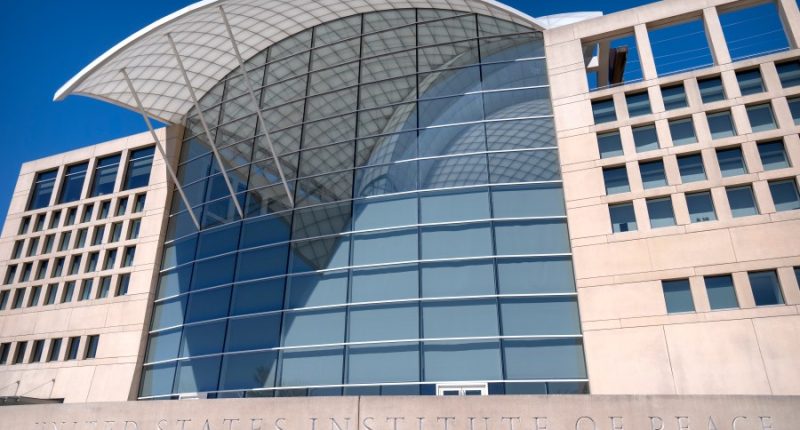Share this @internewscast.com

WASHINGTON (AP) — A federal judge on Monday halted the Trump administration’s efforts to dismantle the U.S. Institute of Peace, which was overtaken in March by Elon Musk’s Department of Government Efficiency.
U.S. District Court Judge Beryl Howell determined that the think tank, established and funded by Congress to resolve violent conflicts globally, was unlawfully taken over by DOGE through “blunt force, backed up by law enforcement officers from three separate local and federal agencies.”
The lawsuit’s plaintiffs, including the organization’s former board members and president, contended that the Institute of Peace was legally established as an independent, nonprofit entity. They also argued that the board members’ dismissal did not adhere to the legally required procedures set forth at the organization’s inception.
The moves also did not go before any of the four congressional committees that have oversight of the institute.
In her ruling, Howell cited the uniqueness of the organization. “The President second-guessed the judgment of Congress and President Reagan in creating USIP 40 years ago, and the judgment of every Congress since then, including in 2024, in appropriating funds to USIP, when he deemed this organization to be “unnecessary” three months ago in EO 14217.”
Trump issued the executive order in February that targeted the institute and three other agencies for closure in an effort to deliver on campaign promises to shrink the size of the federal government. The first attempt by DOGE to take over the headquarters led to a standoff. Members of Musk’s DOGE group returned days later with the FBI and Washington, D.C., Metropolitan Police to help them gain entry.
The institute and many of its board members sued the Trump administration March 18, seeking to prevent their removal and to prevent DOGE from taking over its operations. The firing of the board was followed by a Friday night mass firing by email on March 28, which threw the workforce into turmoil.
At the same time, DOGE transferred the administrative oversight of the organization’s headquarters and assets to the General Services Administration that weekend. Since then, employees were allowed to retrieve personal items but computers, office tools and supplies and furniture were left behind.
In reaching her opinion Howell concluded that USIP “ultimately exercises no Executive branch power under the Constitution but operates, through research, educational teaching, and scholarship, in the sensitive area of global peace. In creating this organization, Congress struck a careful balance between political accountability, on the one hand, and partisan independence and stability, on the other.”
As such, “the Constitution makes clear that the President’s constitutional authority only extends as far as Article II, but even Article II does not grant him absolute removal authority over his subordinates, under current binding caselaw precedent.”
The institute was created by Congress in 1984. The law USIP was signed by then-President Ronald Reagan. The idea was for an organization that would operate outside normal channels to work to promote peace and prevent and end conflicts. At the time it was shuttered, USIP operated in more than two dozen conflict zones, including Pakistan and Afghanistan.
Howell had denied two requests by the plaintiffs for restraining orders — one to halt the firing of the board and another to stop the administration from taking over the institute’s headquarters. That ruling came after she held a status hearing and learned that DOGE-installed leadership had already initiated and completed the transfer of the headquarters before the plaintiffs could even get to court. Howell equated the quick action to a bull in a China shop.
___
Associated Press writers Michael Kunzelman and Thalia Beaty contributed to this story.

















